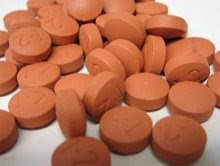 NSAIDs are a tricky class of drugs. As an internal medicine resident, I used to prescribe ibuprofen 800mg po tid willy-nilly for my clinic patients with back pain, since I generally had good results using this strategy, and I myself have used it off and on for a variety of athletic-related aches & pains. After a year’s worth of Nephrology consults, however, I am much more careful. Nephrologists tend to blame NSAIDs frequently–perhaps too often–but there are a variety of ways in which these medications can lead to acute kidney injury. There are three main mechanisms by which NSAID-induced kidney injury may occur, moving from most to least common in the list below:
NSAIDs are a tricky class of drugs. As an internal medicine resident, I used to prescribe ibuprofen 800mg po tid willy-nilly for my clinic patients with back pain, since I generally had good results using this strategy, and I myself have used it off and on for a variety of athletic-related aches & pains. After a year’s worth of Nephrology consults, however, I am much more careful. Nephrologists tend to blame NSAIDs frequently–perhaps too often–but there are a variety of ways in which these medications can lead to acute kidney injury. There are three main mechanisms by which NSAID-induced kidney injury may occur, moving from most to least common in the list below:
1. NSAID-induced hemodynamic injury: Recall that NSAIDs are inhibitors of prostaglandin synthesis. In healthy individuals, prostaglandins do not play a major role in the regulation of renal blood flow; however, in those with underlying renal disease or effective volume depletion (e.g., cirrhosis, CHF) PGI2 and PGE2 preferentially dilate the afferent arteriole thereby augmenting GFR. The addition of NSAID may catastrophically diminish renal blood flow to this group of patients resulting in renal failure.
2. NSAID-induced acute interstitial nephritis (AIN): These patients present with the classic findings of AIN: sterile pyuria, WBC casts, and eosinophils in the urine or blood. Typically NSAID withdrawal is all that is necessary though there remain some who still advocate a short course of steroids.
3. NSAID-induced nephrotic syndrome: this may take the form of either minimal change disease, or membranous nephropathy. The mechanisms by which NSAIDs may cause minimal change disease are presently unknown.

